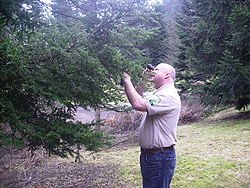
Certified arborist
Encyclopedia

The Certified Arborist credential identifies professional arborist
Arborist
An arborist, or arboriculturist, is a professional in the practice of arboriculture, which is the cultivation, management, and study of individual trees, shrubs, vines, and other perennial woody plants...
s who have a minimum of three years' full-time experience working in the professional tree care industry and who have passed an extensive examination covering all facets of arboriculture
Arboriculture
Arboriculture is the cultivation, management, and study of individual trees, shrubs, vines, and other perennial woody plants. It is both a practice and a science....
. The Western Chapter of the International Society of Arboriculture (ISA) started the certification program in the 1980s. As the program rapidly proved its worth, it was taken over and expanded by the parent ISA organization. More recently, the ISA added specialty certifications of Utility Specialist, for those maintaining vegetation around electric utility wires, Municipal Specialist, for those with additional experience managing public urban trees, and the Board Certified Master Arborist, for those with extensive knowledge that comes with higher levels of education and experience.
The Certified Arborist examination has 200 questions on tree biology, tree identification and selection, tree-soil-water relations, tree nutrition and fertilization, tree planting and establishment, pruning concepts and techniques, cabling, bracing and lightning protection, problem diagnosis and management, tree preservation on construction sites, climbing and safe work practices, and tree risk assessment. Certification is valid for three years, during which time the arborist must complete 30 continuing education units (CEUs) in order to re certify. Certified Arborists earn CEUs by attending seminars, studying in college courses, or completing study in ISA published magazines and books. A study guide outlines the basic knowledge tested on the exam.
The arborist certification program has successfully improved the profession by setting minimum standards of achievement, incentives for continuing education, and an improved image from both the arborist's and the general public's points of view. The language used in arboriculture has become more scientific and educated, and less dependent on vague and ambiguous words like lacing and rounding-over. The more descriptive language Certified Arborists use gives purchasers of tree service a high degree of assurance that their trees will not be damaged or mutilated, and that both they and the arborist understand the effects of a particular treatment.
Both the Western Chapter and the ISA also have Tree Worker certifications. The academic part of the Tree Worker exam covers some tree science and identification, but mostly focuses on the practical aspects of climbing and working in trees. The second part of the exam is an actual demonstration of the Tree Worker's climbing and safety skills. The applicant must also have aerial rescue training and a valid certification for first aid and CPR.
An ISA "Certified Arborist" may not be equivalent to an "Arborist" who is "Certified". Several colleges like Portland Community College
Portland Community College
Portland Community College is Oregon's largest community college, located in Portland, United States. It serves over one million residents in the five county area of Multnomah, Washington, Yamhill, Clackamas, and Columbia...
of Oregon, offer Certifications in Landscape Technology, through courses which include arboriculture, tree identification and other horticulture classes. A student from one of these colleges may function in business with the title "Arborist", and possess the related but different certification. In which case they would be an "Arborist with a certification". But the ISA certification uses the specific nomenclature "Certified Arborist". Also, the ISA Certification is not a "Degree" in Arboriculture; it is a certification that can be maintained and renewed. Many college certificates are based on education and testing, and are permanent. The ISA Certification includes "experience" with testing, and requires continuing education for renewal.
External links
- http://www.isa-arbor.com/ International Society of Arboriculture
- http://www.treesaregood.org/ TreesAreGood.org (arboricultural resources for the general public)

